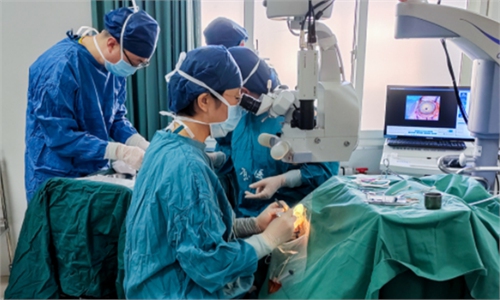
Photo: WeChat account of Air Force Medical University
Chinese scientists have successfully transplanted the liver of a gene-edited pig into a brain-dead human subject to mimic treatment for a patient with liver failure, indicating the potential for gene-edited pig livers to replace human livers. It was the world's first-ever reported case of pig-to-human liver xenotransplantation.
The successful progress of this research marks a significant breakthrough in the field of xenotransplantation and a crucial step forward for xenogeneic liver transplantation clinical research, providing a theoretical basis and data support for future clinical applications.
According to the official WeChat account of Air Force Medical University, a research team co-led by Dou Kefeng, an academician at the Chinese Academy of Sciences, and Tao Kaishan, director of the Department of Hepatobiliary Surgery at Xijing Hospital affiliated with Air Force Medical University, successfully transplanted an entire liver of a multi-gene edited pig into the body of a brain-dead patient as an auxiliary measure on March 10.
During the surgery, the transplanted liver began secreting bile immediately after the blood flow was restored in the subject's body, and no hyperacute rejection was observed. It has been functioning continuously for over 96 hours.
The research explored for the first time the feasibility of xenotransplantation of a genetically edited pig liver into a human body, achieving breakthroughs in originality in terms of scientific theory innovation, core technological challenges, and military medical applications. It will play an irreplaceable role in treatment and repair, functional reconstruction, and transplantation substitution, especially in vital organ transplantation.
China has nearly 400 million liver disease patients, including over 7 million with cirrhosis, and the number of patients with liver failure is 300,000 to 500,000 every year. In cases of liver failure, liver transplantation is the only effective cure. However, the number of organs donated by humans is far smaller than the demand, so carrying out xenotransplantation research is of great importance and is expected to benefit more patients with end-stage liver disease.
Research on organ xenotransplantation has made great progress in recent years. Between 2021 and 2023, US researchers completed four experiments with brain-dead subjects involving the transplant of kidneys from gene-edited pigs, and two pig-to-human heart xenotransplants. These medical breakthroughs have attracted widespread attention.
According to Dou, compared with the kidney and heart, the anatomy and physiological functions of the liver are more complex, so livers from gene-edited pigs cannot completely replace human ones at present. But the experiment provides a theoretical basis and data support for the clinical application of xenotransplantation, Dou added.
The gene-edited pig used in the liver transplant was provided by Chengdu-based Clonorgan Biotechnology. The researchers used gene-editing technology to remove three pig antigens that cause rejection and replaced them with three human proteins.
The recipient was a patient with a severe head injury who was certified as brain dead after three assessments. The family agreed to participate in the scientific research without compensation, contributing to the advancement of medical science.
The team led by Dou and Tao has been experimenting with xenotransplants for 11 years. It had previously completed multiple organ transplants from pigs to monkeys.
Global Times


